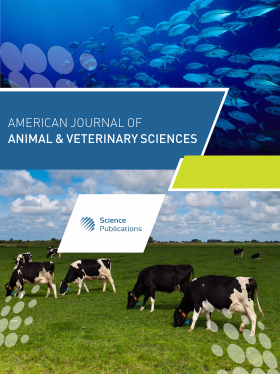Effect of Dietary Polydextrose on Feces Consistency and Macronutrient Digestibility in Healthy Dogs
- 1 Rajamangala University of Technology Isan, Thailand
- 2 Innovation Centre, Thailand
Abstract
Problem statement: There is evidence that the addition of 3% STA-LITE® polydextrose to a dry food reduces clinical signs of osteoarthritis in dogs. For the application of polydextrose as functional ingredient of dog foods, information as to its impact on the acceptance of food, feces consistency, fecal odor and digestibility of macronutrients and minerals is required. Approach: A feeding experiment with 4×4 Latin square design was carried out with 12 adult, healthy Golden Retrievers. The experimental diets consisted of a commercial dry food to which either 0, 2, 4 or 8% polydextrose was added. During the last 5 days of each two-week feeding period, feces of individual dogs were collected quantitatively. Feces consistency and fecal odor were scored. Fecal pH, fecal Lactobacilli and the apparent digestibility of macronutrients and minerals were determined. Results: The various inclusion levels of polydextrose did not affect food acceptance and intake and did not induce changes in body weight. Polydextrose intake did not influence fecal odor and the amount of feces production. Feces consistency was significantly affected by polydextrose; feces became softer with increasing dose. The apparent digestibilities of dietary dry matter, crude protein, crude fat and ash were not significantly affected by polydextrose intake. The apparent digestibilities of crude fiber and nitrogen-free extract were increased by the addition of polydextrose to the diet. Apparent digestibility of polydextrose was calculated to be 92% of intake. The high apparent digestibility of polydextrose points at fermentation of this functional ingredient in the hindgut of dogs, but it was not associated with a further lowering of fecal pH and increase in fecal Lactobacilli. Apparent calcium and phosphorus absorption were not significantly affected by polydextrose intake. Conclusion: In the clinical trial on canine osteoarthritis, a polydextrose dose of 3% in a dry dog food is used. The outcome of this study with healthy dogs indicates that 3% polydextrose may not have negative effects on the variables that are measured.
DOI: https://doi.org/10.3844/ajavsp.2011.105.111

- 6,962 Views
- 6,545 Downloads
- 1 Citations
Download
Keywords
- Polydextrose
- food acceptance
- feces consistency
- macronutrient digestion
- calcium absorption
- phosphorus absorption
